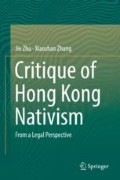Abstract
The oath-taking farce that took place on 12 October 2016 in the Legislative Council Building totally exposed the extremism of the pro-independence camp. On 5 March 2017, Prime Minister Li Keqiang mentioned in his work report that “Hong Kong Independence” leads to nowhere, showing the world the Chinese government’s determination against “Hong Kong Independence.” As a sort of marginalized separatist trend of thought, “Hong Kong Independence” spreads quickly in Hong Kong society, especially mid- and high schools, after the bleak ending of the “Occupy Central Movement.” This kind of ideological trend, a mixture of xenophobia, populism, racialism, and extremism, is “deadly attractive” to teenage students who know little about the society and their motherland. Nonetheless, “Hong Kong Independence” is not accepted by the mainstream of Hong Kong society, because most of Hong Kong residents do not see “Hong Kong Independence” as an option: the massive condemnation of the “Mong Kok Riot” proves that extreme moves are not appreciated by the Hong Kong society. Hereafter, in order to gain more support from the society, “Hong Kong Independence” advocates start to promote “legal and legitimate” sort of “Hong Kong Independence,” i.e., Hong Kong “De Jure Independence.” According to the proponents, the “De Jure Independence” of Hong Kong is lawful, both explicit and civilized; if the authorities decide to suppress it, they could only adopt extralegal means (Joseph Lian Yi-zheng 2016). This kind of plea, of course, has been widely criticized, a mainland scholar put forward legal strategies to cope with “De Jure Independence” of Hong Kong (Wang Liwan 2017). Whereas, it appears to the author that the so-called De Jure Independence of Hong Kong is, ultimately, a trick of doublespeak, without any chance of possibility. Revealing the impossibility of Hong Kong “De Jure Independence” helps exposing the lie of the pro-independence camp and, in the same time, contributes to constructive dialogue between Hong Kong and the mainland.
Access this chapter
Tax calculation will be finalised at checkout
Purchases are for personal use only
Notes
- 1.
See “Explanations on Draft Interpretation of Article 104 of Basic Law of Hong Kong SAR,” http://news.xinhuanet.com/english/2016-11/08/c_135812367.htm
- 2.
FACV 10/1999.
- 3.
FACV 26/2000.
- 4.
HCAL 185/2016.
- 5.
DCCC 710/2016.
References
Anonymous (2016) Our 2047. Undergrad, Finale Issue
Brian Leung (2014) CSSA restriction revocation dispute and local political community. Undergrad 2:24–26
Carl Schmitt (2005) Constitutional theory. Shanghai People’s Publishing House, Shanghai, p 5
Chan Ya-ming (2014) An outburst of the age: Hong Kong democratic independence. Undergrad, September Issue, 30–32
Chen Duanhong (2016) Understanding Hong Kong politics. Peking Univ Law J 5:1125–1148
Duan Lei (2017) On the theoretical connotations, manifestation and countermeasures of ‘Taiwan independence by constitutional interpretations’. Cross-Taiwan Strait Stud 1:41–51
Ho Hei-wai (2016a) The basic law is scarred and battered Hong Kong people must enact a new one. Undergrad, April Issue, 57–61
Ho Hei-wai (2016b) Setting things right Hong Kong decolonization: on the conditions of Hong Kong independence. Undergrad, August Issue, 50–55
Jack Lee (2014) Should Hong Kong have the right of national self-determination? Undergrad 2:34–37
Joseph Lian Yi-zheng (2012) Passport and nationality: on Hong Kong people becoming national minority. Hong Kong Econ J. 2012–01–06
Joseph Lian Yi-Zheng (2016) Whole city focus on Hong Kong Independence eggs infiltrated high walls. Hong Kong Econ J. 2016-07-25
Leung Mei-fun & Chang Chak-yan (2017) Self-determination is not allowed by the law. Bauhinia 1
Liu Qi Ju Shi (2014) War is coming better know the situation. Undergrad, September Issue, 39–41
Lui Ceong-nang and Victor Wong (2017) Hong Kong independence on decline Hong Kong bids farewell to political extremism. Asia Wkly 13
Nakade Hitsujiko (2016) On the possibility of Hong Kong getting kicked out of China. Undergrad, Finale Issue
Tian Fang (2008) Constitutional democracy and the design of referendum. Polit Sci Law 5:81–87
Tso Hiu-nok (2014) Behind Hong-Konger is the whole cultural system. Undergrad, February Issue, 31–33
Wang Liwan (2017) The evolutionary trend and legal Response to the thought of ‘Hong Kong Independence’. Hong Kong Macao J 1:13–25
Wang Yu (2015) Legal consideration of ‘Hong Kong is a nation’. Hong Kong Macao J 1:24–30
Wong Chun-kit (2014) Nativism is the only way for Hong Kong people’s struggle. Undergrad, February Issue, 27–30
Wong Hok-ming (2016) Seeing Hong Kong independence ethos from the legal perspective. Mingpao Daily. 2016-09-08
Yan Kin-wa (2014) Evaluating Hong Kong independence from the military politics perspective. Undergrad, September Issue, 36–38
Zhang Xiaoshan (2016) On the prevention of the joint actions of ‘Taiwan independence’ and ‘Hong Kong independence’. Acad J One Ctry Two Syst 4:114–124
Zou Pingxue (2009) A discussion about the interpretation mechanism of Hong Kong basic law. Leg Sci 5:119–123
Zhou Yezhong, Zhu Jie (2007) A study on the ‘constitutional reform’ in Taiwan. Hong Kong Social Sciences Press, Hong Kong, p 378
Zhu Guobin (2008) Legislative interpretation and article 158 of the basic law. Chin J Law 2:3–26
Zhu Guobin, Tian Feilong (2016) Independence is not an option for Hong Kong. Ta Kung Pao. 2016-10-19
Zhu Guobin, Zhang Xiaoshan (2016) Is the interpretation a strike to Hong Kong rule of law. Ta Kung Pao. 2016-12-06
Author information
Authors and Affiliations
Rights and permissions
Copyright information
© 2019 Springer Nature Singapore Pte Ltd.
About this chapter
Cite this chapter
Zhu, J., Zhang, X. (2019). On the Impossibility of Hong Kong “De Jure Independence”. In: Critique of Hong Kong Nativism. Springer, Singapore. https://doi.org/10.1007/978-981-13-3344-6_6
Download citation
DOI: https://doi.org/10.1007/978-981-13-3344-6_6
Published:
Publisher Name: Springer, Singapore
Print ISBN: 978-981-13-3343-9
Online ISBN: 978-981-13-3344-6
eBook Packages: Law and CriminologyLaw and Criminology (R0)

